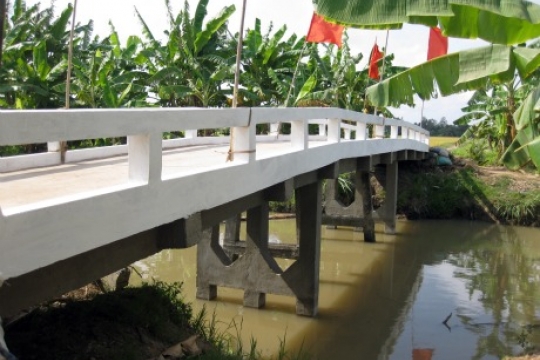Press release from Environmental Economics Unit, School of Business, Economics and Law, University of Gothenburg, 2011-03-18
Vietnamese farmers were invited to voluntarily contribute to the construction of a bridge that everybody would be able to use regardless of contribution. Although traditional economic theory suggests that this type of fundraising should be unsuccessful, the villagers in Giong Trom actually ended up with a brand new bridge. In his experiment, economist Nam Pham Khanh shows that people are generally willing to cooperate and that social influences strongly affect how much individuals choose to contribute to a shared resource.
According to standard economic theory, people tend to ’free-ride’ on the efforts of others, simply because they see a personal benefit in doing so. This means that people are generally not willing to contribute to public goods, such as a bridge across the Mekong River in the village of Giong Trom in Vietnam.
However, researchers have in recent years been able to show that people often do have a willingness to cooperate to overcome social dilemmas. For example, Elinor Ostrom, political scientist and recipient of the 2009 Nobel Prize in Economics, has shown that people who share the responsibility to manage natural resources tend to find ways to do so in a long-term sustainable manner.
In his doctoral thesis, economist Nam Pham Khanh has studied human cooperation and how different types of social influences affect people’s behaviour and willingness to contribute to a shared resource.
Two hundred poor rice farmers in the village of Giong Trom were invited to contribute to the construction of a public bridge that would be free for everybody to use. Each family was given 400 000 dong (SEK 140) as a gift from the research project. They were told that in order for the bridge to be built, the villagers would have to contribute a total of 40 million dong, or 200 000 dong per family on average. Any additional costs would be paid by the research project.
The families were free to either keep the entire gift or contribute any part of it to the construction of the bridge. All contributions were made anonymously, so nobody in the village or the research project had any way of knowing how much any family had chosen to contribute. In case more money than needed would be collected, the extra amount would be returned to the villagers in proportion to their contributions.
The families were divided into five groups; different groups received different information. For example, the families in one group were told that after having interviewed other families in the village, the researchers had learned that one of the most common contributions was quite low – only 100 000 dong. The families in another group got to choose among a number of alternative donations listed on a board by moving a marker from zero to the desired contribution. In both of these groups, the average contribution was 20 percent lower than in the reference group, which did not receive any information at all.
Thus, the research results show that the size of a person’s contribution to a public good is affected both by information about the contributions of others and by provision of a default alternative.
’The results are potentially useful in developing countries, where the provision of public goods relies not only on governments but also on people’s voluntary contributions. We show that the design of information given to individuals influences the ability to provide public goods, which is critical to economic and social development,’ says Nam Pham Khanh.
The study was supported by Sida´s Environmental Economics Capacity Building Programme.
Time and venue for the public defence of the thesis: Friday 18 March at 10 am, room E 43, University of Gothenburg, School of Business, Economics and Law, Vasag. 1, Gothenburg, Sweden.
Thesis title: Prosocial Behavior, Social Interaction and Development: Experimental evidence from Vietnam >> Link to the thesis (pdf)
Author: Nam Pham Khanh
For more information, please contact: Nam Pham Khanh +46 (0)31 786 47 59, pham.khanh.nam@economics.gu.se
Supervisors: Olof Johansson Stenman, +46 (0)31 786 25 38, olof.johansson@economics.gu.se Fredrik Carlsson, +46 (0)31 786 41 74, fredrik.carlsson@economics.gu.se
Information officer: Karin Backteman, +46 (0)31 786 25 95, karin.backteman@economics.gu.se
